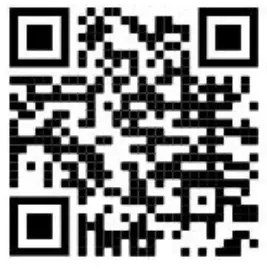REXING M1 Pro 2K Dual Camera Mirror Dash Cam 12″ IPS Touch Screen User Guide
Overview
Thank you for choosing REXING! We hope you love your new product as much as we do. If you need assistance, or have any suggestions to improve it, please contact us. You can reach us via [email protected] or call us at (203) 800-4466. Our support team will respond you as soon as possible.
Always a surprise in Rexing. Check us out here.
https://www.facebook.com/rexingusa/https://www.instagram.com/rexingdashcam/https://www.rexingusa.com/support/registration/https://www.rexingusa.com/support/product-support/
What’s in the Box
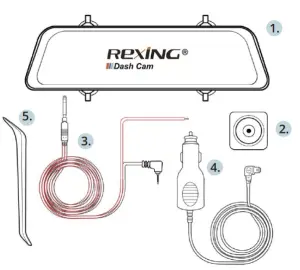
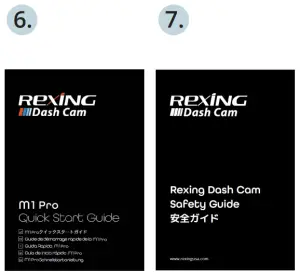
- Rexing M1 Pro Dash Cam
- Waterproof FHD Rear Camera
- Rear Camera Extension Cable (18ft)
- Car Charger (12ft)
- Cable Management Tool
- M1 Pro Quick Start Guide
- Safety Guide
Camera Overview

- Power Button / Screen Toggle Button
- SB Charging Port
- Rear Camera Port
- Micro SD (TF) Card Slot
- GPS Logger Port
- Reset Button (On the back )
Screen Icons

- Swipe left/right on touchscreen to switch front/rear view
- Swipe up/down on touchscreen to adjust view angle
- Swipe right to access video/photo playback mode.
Installation
Step 1: Install the Dash Cam

Unhook the straps in the back of the front camera, then wrap them around your rearview mirror.
Connect the straps to the hook on the back of the camera to secure the camera to the rearview mirror.
Step 2: Insert the Memory Card
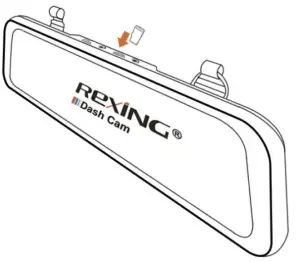
The Rexing M1 Pro accepts [Class 10/UHS-1 or higher] Micro SD memory cards up to 256GB.
You will need to insert a memory card before you can begin recording. Before inserting or removing a memory card, first ensure you’ve powered down the device.
Gently push the memory card in until you hear a click, and allow the spring release to push the card out.
Step 3: Power the Camera and Format the Memory Card

Power the camera by connecting the charger to the car cigarette lighter and camera. To ensure the M1 Pro records to your memory card properly and without error. Before you start using a new memory card, you must format the card within the camera using the format function. Always backup card before formatting.
To format the memory card, make sure you have inserted your memory card, then turn on the device by connecting to a power source. Upon turning on the camera, tap Record button to stop recording. Then tap the Settings button to access the Settings Menu.
Use the arrow keys to navigate to the “Format” option. Once this option is highlighted, you will be asked to confirm your choice. Tap “Confirm” to confirm.
You may now disconnect from power. The camera will shut down after 10 seconds. The camera should begin recording automatically the next time it is powered on.
Step 4: Hardwire the red line to rear tail reverse light
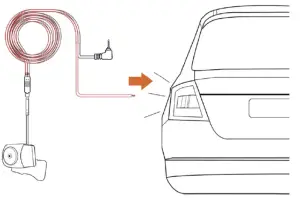
In order to use automatic backup camera switch function, connect the red line of rear camera to your car’s rear tail reverse light.
When put the car on reverse, the dash cam will automatically switch to backup camera view.
Step 5: Mount the Rear Camera

Mount the rear camera as shown below. Use the rear camera extension cable to connect the waterproof rear camera to the front camera.
Step 6: Installing the Camera onto the Rear Mirror
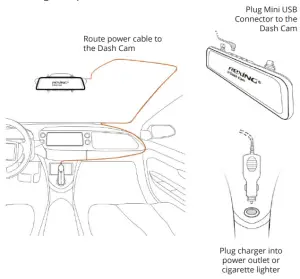
Unhook the straps in the back of the front camera, then wrap them around your rearview mirror and carefully route the power cable around the windscreen and tuck it under the trim.
Plug the Car Charger Cable to a 12V DC power outlet or the car cigarette lighter.
Connect car charger to the camera. The camera will auto-start recording once powered on.
Basic Operation
Device Power
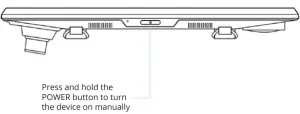
The device will be automatically powered on when plugged into a 12V accessory socket or cigarette lighter when receives a charge (i.e.: the vehicle is started).
To turn the device on manually, press and hold the POWER button until the welcome screen appears. The camera will automatically start recording when powered on.
Power the camera On. If the camera is recording, tap the record button to stop recording.
Swipe ![]() right to toggle to the playback mode.Tap
right to toggle to the playback mode.Tap ![]()
![]()
![]()
Video Recording
The camera will automatically start recording when the device receives a charge. The red dot will blink when recording. Tap the record button to stop recording.
Video Playback




Playback of videos can be done on the device or a computer.
To playback a video on the device, switch to Playback mode by swiping right.
Press “Front Ordinary video” on the left top to switch between front and rear camera recordings, as well as locked recordings and photos.
In Playback Mode, you may lock or delete recordings with the respective icons on the bottom right of the display, right beneath the time and date.
Scroll between your files by swiping up and down on the file list.
To play back a recording, tap the name of the file you want to play back, then tap on the preview frame to play.
While playing back a recording, you can ![]()
![]()
![]()
![]()
To exit a recording, ![]()
![]()
To playback a video on the computer, use an SD card adapter.
To playback a video using an SD card adapter, remove the memory card and insert it into an SD card adapter. Place the adapter in the computer.


Recommended Media Players: QuickTime Media Player / VLC / Windows Media Player
Insert your micro SD into an SD card adapter, then insert the SD card adapter into your computer (or card reader) to access your card storage. Your front and rear camera videos will be stored under the corresponding folders, sorted into the “Front_xxx” and “Back_xxx” subfolders respectively.
Locked videos can be found on the memory card under the “front_emr” and “back_emr” folder.
Taking Photos
To take a photo, tap the ![]()
![]()
To view a photo or video, swipe right to enter Playback mode. Tap “Front ordinary video” to select all the recording type selections. Swipe up/down on the screen to toggle through your photos.
To delete a photo, stop video recording and toggle to the Playback Mode and toggle through the videos and photos to the one you want to delete.
Press ![]()
![]()




GPS Logger
(GPS Logger need to purchase separately)
When connected to the camera, it will record the speed and location of your vehicle as you drive.
You can then access this information while playing back your recordings using the GPS Video player (For windows and Mac, available at rexingusa.com).
The dash cam will automatically search for the GPS signal once it’s connected to the power source. Press the Setting button and go to System Settings. Toggle the GPS Speed Unit setting, and select your favorite speed unit.
After a GPS signal is found, the screen icon will turn from not connected to active – as per the below icons.


Parking Monitor
Please visit www.support.rexingusa.com to watch a video tutorial.
References
[xyz-ips snippet=”download-snippet”]


